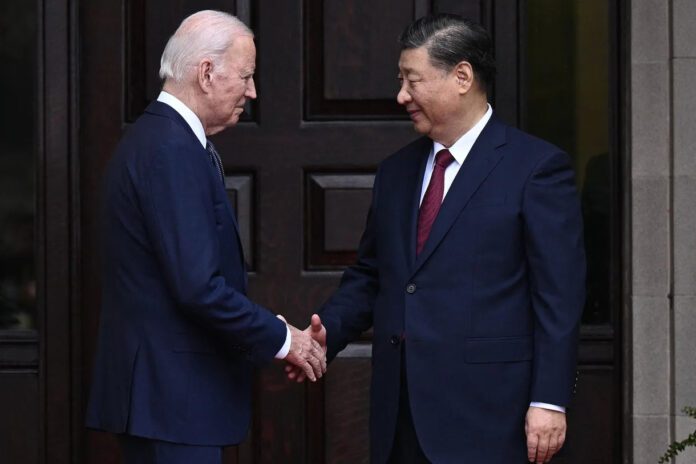In the intricate realm of artificial intelligence (AI), a peril looms larger than the specter of “killer robots” — the militarized AI and its profound implications for nuclear security. Authored by Jeffrey Lewis, a prominent professor specializing in nuclear arms control, this article explores the intricate dynamics surrounding the convergence of AI and nuclear weapons and the imperative for world leaders to address this unprecedented challenge.
I. The Summit’s Silent Agenda
The recent summit between President Joe Biden and Chinese leader Xi Jinping garnered attention for its seemingly unrelated highlight — pandas. However, beneath the surface, the discussions hinted at a far-reaching concern: the risks associated with artificial intelligence. While no formal agreement to ban AI emerged, the prospect of US-China talks on AI’s implications, especially in the realm of nuclear control, cast a spotlight on the urgency of addressing this emerging threat.
Definitional Quandaries
The absence of a neat definition for distinguishing everyday AI from the potentially perilous AI prompts a nuanced approach. AI is already deeply embedded in civilian life, excelling in diverse domains. Attempts to categorically ban AI in military systems face resistance due to its indispensability. The blurred lines between beneficial and risky AI applications underscore the need for a nuanced, adaptive strategy.
II. The AI Arms Race
In the quest for technological supremacy, a burgeoning arms race in AI unfolds. Nations, including the US and China, rush to integrate AI advancements into their military systems. The transformative potential of AI propels nations toward harnessing its capabilities, emphasizing the need for a comprehensive framework that aligns AI applications with ethical and security imperatives.
Incremental Progress and Ethical Considerations
To navigate the intricacies of AI’s role in military systems, a cautious and incremental approach is pivotal. The ethical considerations surrounding the development and deployment of AI demand a delicate balance between technical advancements and ethical safeguards. Open dialogues between nations become paramount to collectively chart an ethical course for the integration of AI in military contexts.
III. The Nuclear-AI Nexus
The article posits that the marriage of AI with nuclear weapons presents a paradigm-altering challenge. The convergence of these two powerful forces necessitates a reevaluation of existing nuclear policies. While a “human-in-the-loop” principle is touted as a safeguard, the article questions its effectiveness, especially as AI increasingly influences decision-making.
The Pitfalls of Decision Support
Relying on AI for decision support raises concerns about the meaningful control exerted by human decision-makers. The inherent biases within AI systems, shaped by existing preferences, pose challenges to objective decision-making. The article contends that the danger lies not in fully automating decision-making but in leaders depending on AI for nuanced guidance in high-stakes scenarios.
IV. Rethinking Nuclear Postures
In the evolving landscape of artificial intelligence (AI) and its intricate relationship with nuclear security, a pivotal consideration surfaces—the imperative to reassess established nuclear postures. As leaders worldwide progressively incorporate AI into their decision-making processes, this section underscores the necessity for a paradigm shift in approaching national nuclear strategies.
Rethinking AI Reliance:
The conventional dependence on AI-generated information, particularly in time-sensitive scenarios like “launch on warning,” demands a comprehensive reevaluation. The article posits that meaningful human control over crucial decisions necessitates a fundamental redesign of existing nuclear postures. This entails moving beyond a blanket reliance on AI-generated data, recognizing both its capabilities and limitations in the context of nuclear decision-making.
Addressing Time Sensitivity:
In scenarios where time is of the essence, such as potential nuclear threats, the role of AI becomes both crucial and challenging. Rethinking nuclear postures involves devising strategies that balance the expediency offered by AI with the need for human oversight. Ensuring that decisions with catastrophic consequences retain a human-centric approach is at the core of this paradigm shift.
Ethical and Security Implications:
Beyond the technical aspects, the reconsideration of nuclear postures delves into the ethical and security dimensions of integrating AI. The potential for unintended consequences and the ethical dilemmas posed by relying on AI in life-or-death situations necessitate a thorough examination. Striking a balance between harnessing AI’s capabilities and preserving human control becomes a delicate yet essential endeavor.
The Need for Global Dialogue
Amidst the intricate intersection of AI and nuclear decision-making, the collaborative efforts between the United States and China emerge as a promising model. However, the scope transcends bilateral engagements, emphasizing the imperative for a broader global dialogue.
Comprehensive Frameworks:
The collaborative frameworks envisioned here extend beyond technological considerations. They delve into the ethical, geopolitical, and security dimensions of AI’s role in shaping the future of nuclear postures. These frameworks serve as a template for fostering transparency, trust, and shared responsibility in navigating the intricate landscape where AI and nuclear security converge.
Navigating Complexity:
The global dialogue advocated for in this context aims to navigate the complexities associated with AI in nuclear decision-making. It acknowledges that the challenges posed by AI are not confined to national borders and require a collective, international effort. This collaborative approach ensures a more holistic understanding of the implications of AI in the nuclear domain.
Shared Responsibility:
As nations grapple with the integration of AI into their defense mechanisms, the need for shared responsibility becomes paramount. A global dialogue fosters an environment where nations collectively address challenges, share insights, and work towards establishing norms and guidelines for the ethical and responsible use of AI in nuclear contexts.
In essence, the rethinking of nuclear postures coupled with a global dialogue underscores the dynamic interplay between technological advancements and the broader considerations of ethics, security, and international cooperation.
V. Conclusion: Forging a Responsible Future
In conclusion, the article underscores the need for a responsible and adaptive approach to the intersection of AI and nuclear security. The evolving landscape demands continuous dialogue, transparent collaborations, and a commitment to shaping AI applications that align with human values. As the world grapples with the profound implications of militarized AI, the path forward necessitates vigilance, ethical foresight, and a shared commitment to a future where AI serves as a force for global good.










